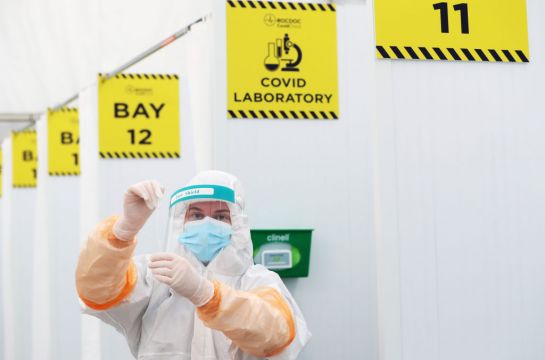Ireland can avoid a fourth wave of coronavirus if people stick to public health measures and avoid indoor gatherings, the Taoiseach has said.
Micheál Martin said the measures had worked in bringing the case numbers down “significantly” but he was now concerned that numbers were flattening.
Mr Martin told RTÉ Radio 1’s News at One: “People have been extremely good here in terms of the impact they’ve had on the virus.
“We have to stand back and say we’ve brought numbers down very, very significantly from where they were two months ago.
“I mean, two months ago we had 2,000 people in hospital. We have to avoid that kind of pressure ever again going on our hospital system, so we are concerned that the situation has remained static.”
Use of the AstraZeneca COVID-19 vaccine has been restarted after a temporary pause. The AstraZeneca COVID-19 vaccine is safe and effective. Go to your appointment if this vaccine is offered to you. Visit: https://t.co/cCTPQAmaeF#HoldFirm #CovidVaccine pic.twitter.com/69wiIwpveO
— HSE Ireland (@HSELive) March 22, 2021
The Taoiseach described the UK variant as the “most significant factor”, combined with more congregation and a degree more mobilisation “that is allowing the figures to flatten and increase somewhat in the last number of days”.
“What I would say to people is that we have control of this and we must avoid congregation indoors at all costs,” Mr Martin said.
“If we stick with this and if we manage to adhere [and] keep outdoors, avoid the indoor congregations, I think we can avoid a fourth wave.”
The Taoiseach said the mental health and wellbeing of people would be taken into account when Cabinet meets to consider any easing of public health restrictions from April 5th.
He also said the reopening of schools had “worked well” and that he did not foresee any changes to the timeline for the return of other students, despite the rising cases of the virus.
Mr Martin added that the Government would make a “comprehensive announcement” early next week to tell people what will happen after April 5th, when the current restrictions are due to lapse.
His remarks come as a senior health official warned Ireland is in danger of facing another wave of Covid-19 cases.
The HSE’s lead for infection control, Professor Martin Cormican, described case numbers as “stuck” and possibly rising.
Sunday saw 769 new cases of Covid-19 confirmed by the Department of Health, the highest daily increase in cases reported since February 26th.
There were also two more deaths of people with Covid-19.
Prof Cormican told RTÉ Radio 1’s Morning Ireland programme: “[Cases] are pretty much stuck, possibly going back upwards a bit. There’s a real danger of another surge.
“We certainly all hoped to be in a better place than we are. We need to deal with the reality of where we are and we need to be very careful.”
Prof Cormican described the increase in case numbers as disappointing and urged the public to continue in their social distancing efforts because the more people come together, the more the virus spreads.
“That’s really hard because what’s got us through so far is that people have put up with a great deal of isolation and loneliness, and burdened it as necessary to control the virus,” he said.
“Unfortunately it is still necessary because the new strain does seem to spread faster than the one we were used to. And that makes everything harder and makes it harder for everyone.”
He added: “The vast majority of people are trying really hard to adhere to the restrictions as much of the time as they possibly can.
Face coverings can help prevent the spread of #COVID19. But if you wear one, you should still do the following:
✅social distancing
✅covering your mouth & nose when you cough & sneeze
✅washing your hands
✅not touching your eyes, nose or mouth pic.twitter.com/2IRs1NVwtX— HSE Ireland (@HSELive) March 22, 2021
“There are some people who are less careful and I suppose we continue to appeal to them and to explain to them that the risks that they’re taking is not just a risk for them, the risk that they’re taking is a risk for everyone they know and care about in the two weeks after they take that risk.”
Prof Cormican said the situation in hospitals had improved and described schools as stable, but warned they were seeing a spread in infection in workplaces and other settings where people gather together, such as birthday parties and wakes.
“It makes no difference to the virus if it is a wake or a birthday party,” he added.
His comments come as the country’s long-awaited mandatory quarantine system is set to become operational later this week.
People arriving from 33 countries flagged as high risk will have to quarantine in hotels for 14 days.
Mandatory quarantine will also apply to people arriving into Ireland without a negative PCR test.
Meanwhile, as of March 18, 654,251 doses of Covid vaccines have been administered in Ireland.
The latest figures from the Central Statistics Office (CSO) showed the vast majority of people are continuing to stay local to their homes.
An estimated 65.7% of the population stayed local (within 10km of home) during the week ending 12 March 2021 according to the Staying Local Indicator (SLI), a seven-day rolling averagehttps://t.co/mr9EPODULr #CSOIreland #Ireland #COVIDIreland #Health #SocialImpact pic.twitter.com/ZYlur7Qp91
— Central Statistics Office Ireland (@CSOIreland) March 22, 2021
Some 65 per cent of the population stayed local (within 10 kilometres of their home) during the week ending March 12th.
All counties showed modest increases between March 5th and 12th according to the CSO’s Staying Local Indicator.
These increases ranged from 0.5 percentage points in Leitrim to 2.5 percentage points in Donegal, Louth, Sligo, indicating some tightening of mobility behaviour.
Dublin continues to be the county with the highest percentage of the population staying local (80 per cent) reflecting its urbanised nature and access to services compared with other counties, while Mayo had the lowest percentage of the population staying at home at 50 per cent.
The propensity of people to stay within 10km of their home tends to differ by county, as movement is affected by local circumstances and conditions, such as access to services and levels of urbanisation.







